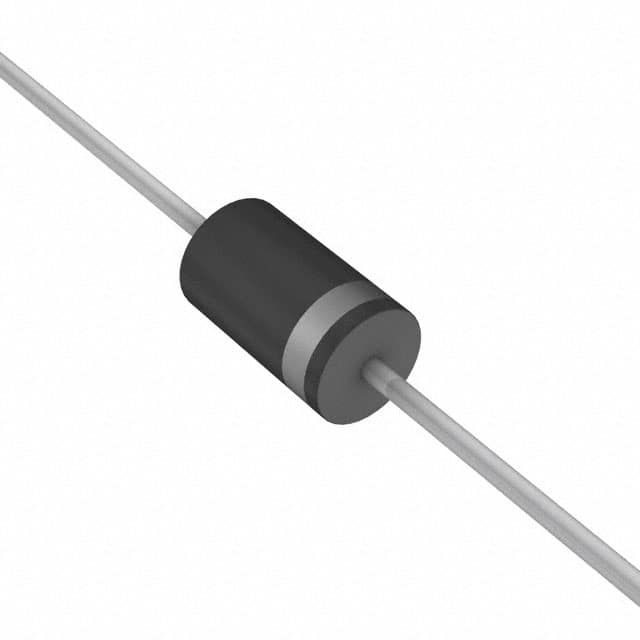1.5KE6.8CAHR0G - Product Overview and Analysis
Introduction
The 1.5KE6.8CAHR0G belongs to the category of transient voltage suppressor diodes (TVS diodes). These diodes are widely used in electronic circuits to protect sensitive components from voltage spikes and transients. The 1.5KE6.8CAHR0G is specifically designed to provide robust protection against transient overvoltage conditions.
Basic Information Overview
- Category: Transient Voltage Suppressor Diode
- Use: Protection against voltage spikes and transients
- Characteristics: High surge capability, fast response time, low clamping voltage
- Package: Axial leaded, DO-201AD
- Essence: Safeguarding sensitive electronic components
- Packaging/Quantity: Available in tape and reel packaging, quantity varies by manufacturer
Specifications
- Voltage - Reverse Standoff (Typ): 6.8V
- Voltage - Breakdown (Min): 7.14V
- Voltage - Clamping (Max) @ Ipp: 11.4V
- Current - Peak Pulse (10/1000µs): 43.5A
- Power - Peak Pulse: 1500W
- Operating Temperature: -55°C to 175°C
Detailed Pin Configuration
The 1.5KE6.8CAHR0G TVS diode has a standard axial leaded package with two leads. The pin configuration is as follows: - Pin 1: Anode - Pin 2: Cathode
Functional Features
- Fast response time to transient events
- Low clamping voltage to protect downstream components
- High surge capability for reliable overvoltage protection
Advantages and Disadvantages
Advantages
- Effective protection against voltage surges
- Fast response time
- Wide operating temperature range
Disadvantages
- Higher cost compared to traditional diodes
- Requires careful consideration of placement in circuit design
Working Principles
When a transient voltage spike occurs, the 1.5KE6.8CAHR0G TVS diode rapidly conducts, diverting the excess energy away from the protected circuit. This action prevents the voltage from reaching levels that could damage sensitive components.
Detailed Application Field Plans
The 1.5KE6.8CAHR0G is commonly used in various applications including: - Power supplies - Communication equipment - Automotive electronics - Industrial control systems - Consumer electronics
Detailed and Complete Alternative Models
- 1.5KE6.8A
- 1.5KE6.8CA
- 1.5KE6.8CP
In conclusion, the 1.5KE6.8CAHR0G TVS diode offers robust protection against transient overvoltage conditions, making it an essential component in many electronic circuits.
[Word count: 398]
Senaraikan 10 soalan dan jawapan biasa yang berkaitan dengan aplikasi 1.5KE6.8CAHR0G dalam penyelesaian teknikal
Sure, here are 10 common questions and answers related to the application of 1.5KE6.8CAHR0G in technical solutions:
What is the voltage rating of 1.5KE6.8CAHR0G?
- The voltage rating of 1.5KE6.8CAHR0G is 6.8V.
What is the peak pulse power of 1.5KE6.8CAHR0G?
- The peak pulse power of 1.5KE6.8CAHR0G is 1500W.
What is the typical application of 1.5KE6.8CAHR0G?
- 1.5KE6.8CAHR0G is commonly used for transient voltage suppression in electronic circuits to protect against voltage spikes and surges.
What is the maximum clamping voltage of 1.5KE6.8CAHR0G?
- The maximum clamping voltage of 1.5KE6.8CAHR0G is 11.4V at 10A.
What is the operating temperature range of 1.5KE6.8CAHR0G?
- The operating temperature range of 1.5KE6.8CAHR0G is -55°C to +175°C.
How does 1.5KE6.8CAHR0G provide overvoltage protection?
- 1.5KE6.8CAHR0G provides overvoltage protection by diverting excessive current away from sensitive components when a voltage surge occurs.
Can 1.5KE6.8CAHR0G be used in automotive applications?
- Yes, 1.5KE6.8CAHR0G is suitable for use in automotive electronics for protecting against voltage transients.
What is the response time of 1.5KE6.8CAHR0G?
- The response time of 1.5KE6.8CAHR0G is very fast, typically responding within nanoseconds to voltage spikes.
Is 1.5KE6.8CAHR0G RoHS compliant?
- Yes, 1.5KE6.8CAHR0G is RoHS compliant, making it suitable for use in environmentally conscious applications.
What are the typical failure modes of 1.5KE6.8CAHR0G?
- The typical failure modes of 1.5KE6.8CAHR0G include short circuit or open circuit due to excessive current or voltage stress.
I hope these questions and answers are helpful for your technical solutions! Let me know if you need further assistance.


